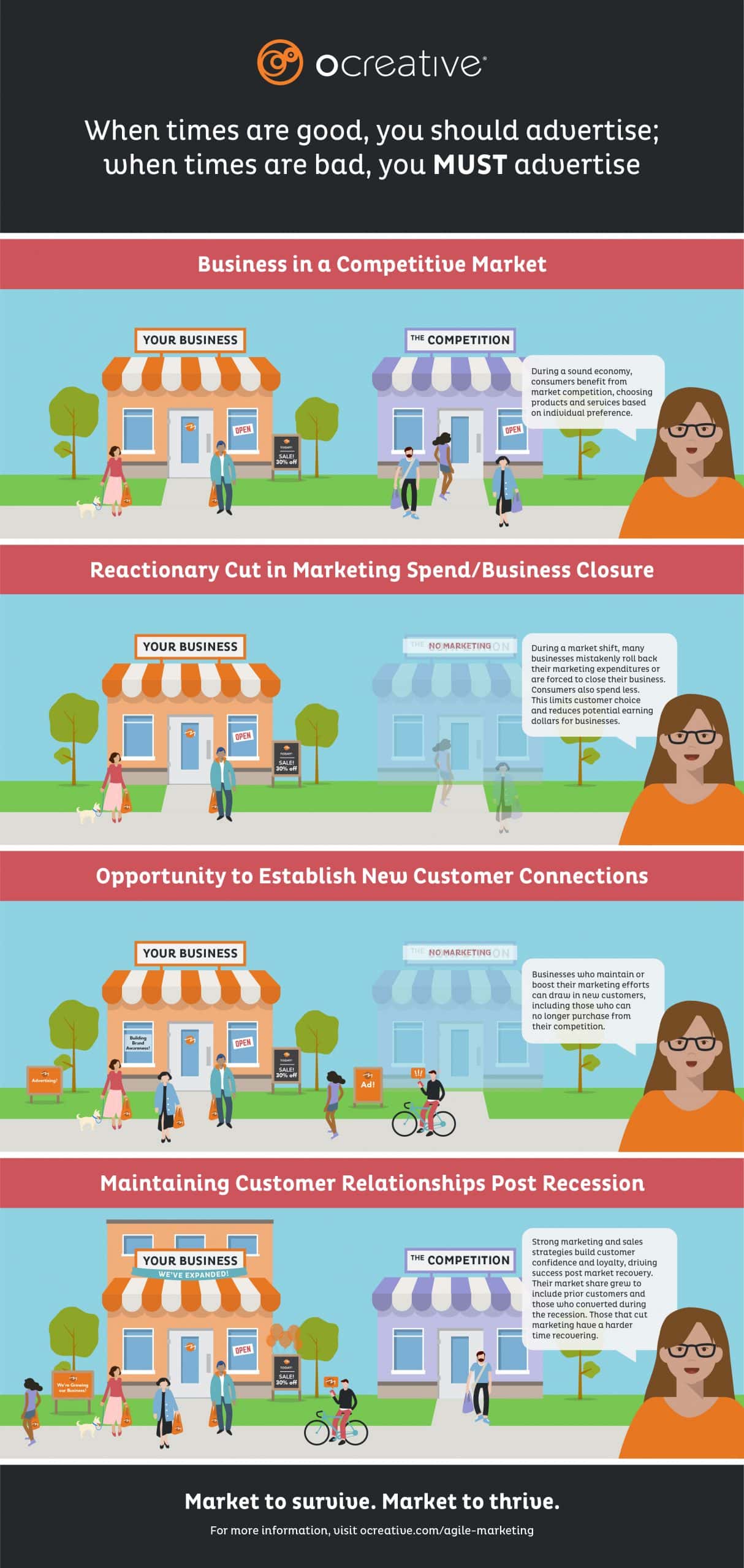Marketing Insights
Revisiting the Need to Advertise During a Recession: A Current Market Analysis
We’ve noticed a lot more traffic to our two blogs: When times are good you should advertise, when times are bad you MUST advertise and Market your business through the recession over the last couple of weeks. This is definitely understandable given the recent market shift. We took some time to revisit these blogs and provide you with updated information and analysis on effectively marketing through a recession.

Over the last 16 years, we’ve had a lot of experience helping businesses navigate through market highs and lows, increased market competition, and shifts in consumer expectations. And while things ebb and flow, one thing remains consistent, a strong marketing plan can help businesses weather any storm. But we’re not the only ones driving this point home – Forbes sourced our information in their own article When A Recession Comes, Don’t Stop Advertising and we couldn’t agree more.
Building an Agile Marketing Strategy
It’s understandable that companies would want to baton down the hatches and work to protect short-term profitability in lieu of long-term strategy, but now is not the time to throw the proverbial baby out with the bathwater. Now is the time to adapt, to show agility, and to show your target audiences a strong ability to respond to crisis. It’s time to take a look around, find out where your consumers are, and meet them there.
Shifting Your Marketing Budget to Viable Platforms
There’s no doubt that, amidst the Covid-19 restrictions, folks are spending more time at home. A large portion of the workforce is spending their days in an in-home office while another major segment has been laid off. The truth is, most Americans have more time interacting with media now, than they did before. We’re taking in news media more aggressively, spending more time on video-streaming services, participating in social media dialogues, and learning to connect digitally with remote communication platforms. That’s a lot of digital marketing channels to leverage and a lot of attention to capture.
Sure, people are tightening their purse strings which means they are looking for deals. Now is the time to work with your marketing team to create a customer-based sales plan that focuses on providing value in a time of need. If consumers are limiting their spend it’s important that your business is top of mind. That means a shift from outdoor and print advertising to building your digital presence. Now is the time to revamp your pay-per-click campaign, build or enhance your email marketing strategy, and develop your social media presence. These strategies cost less to implement, and when done correctly, can drive both short-term and long-term profits.
Gaining a Competitive Advantage
A study done by the University of Southern California analyzed several past studies on the effects of advertising during recessions and found that as the economy rises and falls, so do marketing and advertising expenditures. (Kessler, Marketing During a Recession) Understanding this pattern can help businesses gain a competitive advantage when planning their marketing strategies during bear markets. It stands to reason if competitors will be marketing less to pursue short-term savings, this provides a crucial window to advertise products and services with significantly less competition. In short, advertising becomes more effective with less competitive noise. Now is the time to take advantage of ad space and meet your customers exactly where they are.
Building Long-Term Marketing Strategy to Enhance Recovery
In A Critical Review and Synthesis of Research on Advertising in a Recession, Gerard J. Tellis, Marshall School of Business, critically notes that the marketing and advertising strategy used by a company during a recession has far-reaching effects, well beyond the recession itself. (Tellis, 2009) Companies that advertise less during an economic decline not only see reduced sales during the recession, but also after the economy begins to recover. Conversely, companies that maintain or enhance their marketing initiatives during low market periods are more likely to boost short and long-term sales.
In a study of U.S. recessions, McGraw-Hill Research analyzed 600 companies covering 16 different SIC industries from 1980 through 1985. The results showed that business-to-business firms that maintained or increased their advertising expenditures during the 1981-1982 recession averaged significantly higher sales growth, both during the recession and for the following three years, than those that eliminated or decreased advertising. By 1985, sales of companies that were aggressive recession advertisers had risen 256% over those that didn’t keep up their advertising. For more information on the long-term effects of marketing through a recession, please see our article When times are good you should advertise, when times are bad you MUST advertise.
Start Planning Today
At Ocreative, we’ve proudly built long-term relationships with a number of clients in our community, nationally, and globally. We’ve been through market shifts before and we’re ready to help businesses and organizations effectively navigate through the coming months. If you’re interested in developing a short-term agile strategy to gain market share or you’d like to learn more about long-term strategies, we’re here for you. Your time is now, and we’re ready to help.
About Us
Ocreative is a Milwaukee marketing agency, with expertise and broad experience in developing digital marketing strategies, and growing their online presence, for their clients. The company’s core values include offering the highest level of customer service, award-worthy quality, and performance that surpasses client expectations. Ocreative is located just outside Milwaukee, and works with clients locally, nationally, and globally. Their clients have access to some of the most fun and knowledgeable professionals around – ones who inspire, educate, and problem solve. The agency provides marketing and brand strategy, advertising and design, website design and social media, and video expertise to their clients, fulfilling their desire for business growth, and their aspiration to make a mark on their industry.



